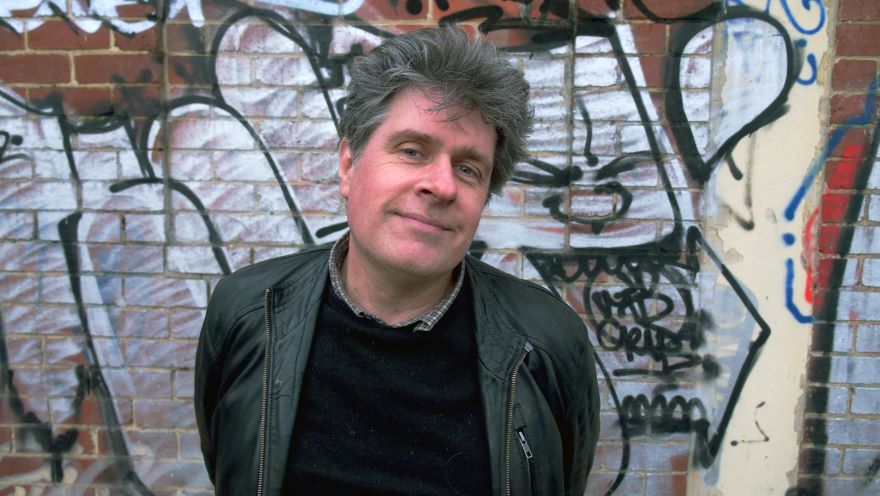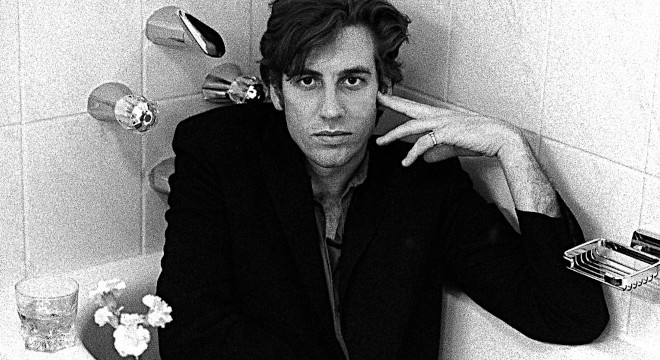The movie about local icon David McComb (The Triffids) opens this month at Luna Cinemas. Director Jonathan Alley talks with Seesaw about a doco 13 years in the making.
What to SEE: Love in Bright Landscapes
3 September 2021
- Reading time • 10 minutesFilm
More like this
- The great unknown
- Darkness lights the way
- Shining a beacon of light on our history
This article is sponsored content.
The premiere season of Love in Bright Landscapes opens on the 9th September with a series of special events including live performances of Triffids songs and a post-screening Q&A with the Melbourne director Jonathan Alley. Seesaw editor Rosalind Appleby caught up with Alley to find out what the excitement is all about.
Rosalind Appleby: What drew you to direct this documentary about the singer/songwriter David McComb?
Jonathan Alley: When David died, it was obviously tragic. But beyond that human tragedy, to me, was a certain injustice that lay in his lack of recognition. His work was so powerful and well-realised, and in Australia people just missed it. I wanted to distil what made him great beyond the simple (if apt) descriptions I’d read of him by music writers. The most powerful and effective way to do that was to make a film. I wanted to elevate the emotive elements of his story , both uplifting and sad, beyond the music world’s forgotten box of yesteryear’s tales. I wanted to make him present again, for 100 minutes, anyway.

RA: It sounds like a real labour of love – why did it take 13 years?
JA: I’ll always remember the German filmmaker Wim Wenders talking about “the disease of words and images” in his film Until the End of the World (partially shot in Australia). David’s imagery – in his lyrics, his poems, and in the wider world of the songs when given life and breath by The Triffids – is quite breath-taking, ever evolving, and keys into human experience. A by-the-numbers rock doc with some talking heads was never going to pass. I had to find the right “words and images” to do right by his work. Even if I couldn’t match it, taking an instinctual, gut approach was always going to serve a story like David’s more. So, I had to wait until I felt I had the right materials. Between 2016 and 2018, certain elements coalesced: his father’s home movies and colour photos, the long-running correspondence with his elder brother John, the publication of his poems, and the right voice to read them (the writer DBC Pierre) all combined to elevate the film to something that could tell the story more effectively than a conventional narrator or interviewee. Short answer to your question: had to wait until it felt right, and I’m glad I did.
RA: McComb founded and fronted The Triffids in Perth in the late 70’s. The band moved to the east coast then London and found success but within a decade it all seemed to fizzle out and the band folded. Their legacy, however, seems to only increase as time passes. Why is that?
JA: We live in fickle times. Culture doesn’t have a shelf life anymore, unless it’s some mega-marketed binge-watched TV show on a platform. There’s some great art around, no doubt about it at all, but to find it you have to travel down the rabbit hole of that blog, that social media post that leads you to that page/stream etc. Music isn’t a cultural event anymore; it’s just more content. When Dave and The Triffids were at the height of their powers, it was the opposite, far more mono-cultural. But the deadening effect of that was a lack of traction; if that one BBC music programmer didn’t add you back in 1987, that was kind of it, you’d be struggling. So given that, why does the legacy endure? The songs speak to people’s deeper core, their emotional centre if you like, and once people are hooked they can’t dismiss the experience. And, that’s why there’s been the wider renaissance in David’s work: the Triffids reissues, the publication of his poems, Bleddyn Butcher’s biography Save What You Can and the new album of his last songs “Truckload of Sky Vol 1” recorded by his close friends. If people didn’t care, those things wouldn’t have gained the attention they have done; I hope our film proves a worthy addition to the list.

RA: BBC Magazine wrote of The Triffids: “This is not just the sound of an isolated part of the Antipodes – it’s the sound of humanity, all over the globe.” Why do you think David McComb’s songs (and the stories in them) had such a global appeal?
JA: The answer lies in your astute question. Why do they have such a global appeal? It doesn’t matter where the songs are set – whether it’s an estuary, a mountain village, or some borrowed passage of biblical scripture – the songs are about what it means to be a human being. No matter what your ethnicity, sexuality, gender identity, sooner or later you’re going to fall in love. When that stops, it hurts. That’s what these songs are about, in the main. It’s the first line of dialogue in the film! David says (in a 1986 ABC radio interview): “They’re all just tearjerker love songs… whatever happens to them, happens to them.” It’s a throwaway comment but it’s proved prescient: the songs’ author has gone and they remain flitting around the ether, finding everyone’s hearts, minds and ears. And people feel ‘em, get ‘em, go deep with ‘em, everywhere! And I hope this film helps that continue.
RA: Do you think The Triffids had an impact on the international perception of Western Australia?
JA: As a non Western-Australian, hard for me to judge. Perhaps , in certain quarters the sound of a record like Born Sandy Devotional might have been seen as exotic in the old world European climes, in the music media and by certain fans. But those impressions are constructed, romantic – though real in ways of course. Is everyone in WA chasing their ex-lovers up dark roads in the middle of nowhere? Course not. That said, something as artful as Born Sandy effortlessly states that music from Australia, and WA specifically, was far more complex, metaphorical and powerful than people overseas had realised before. And when you consider Dave invoked Tim Winton’s An Open Swimmer as one source of inspiration (inevitably among many), there’s a certain milieu that becomes apparent; but it’s only one level of the work. Dave, as a writer, worked with what he saw around him, and what he knew. Inevitably those images and familiar feelings rise up in the music, but it’s only one element of many.
“I wanted to elevate [David McComb’s] story, both uplifting and sad, beyond the music world’s box of forgotten yesteryear’s tales. I wanted to make him present again, for 100 minutes anyway.”
RA: McComb’s health was permanently impacted by his alcoholism and drug use, leading to his shock death at the age of 36. How did you get past the ‘tragic artist’ stereotype to reveal a more nuanced portrait?
JA: Quite easily. There’s so little that’s stereotypical about David’s personality and artistic output, that once we found the aesthetic tools to tell the story, we just had to harness the interviews in a way that truly reflected him in a genuine way. That’s the advantage of having him as a subject: he was one of life’s few originals and people loved and admired him, not just his work. Our interviewees were candid, generous, forthright and articulate; they did him justice, basically.
RA: After diving so deeply into the life and music of David McComb, did you come to any conclusions or reach a greater clarity about the kind of man he was?
JA: In the first few minutes of the film, a close musical colleague and friend says “he needed to be about five people at once, to be happy”. To say he was enigmatic is an understatement. But that said, he was just careful I think; he had quite a preserved sense of self. In all the archival interviews he very rarely reveals anything too personal. He speaks a lot about his music (as you’d expect) and ventures opinions about all manner of other artists (and very astutely) but he hardly even talks about where he’s really at. So he was a fairly private man (and fair enough) but his humour – self-effacing, black, and deeply ironic – was never far away.
RA: What do you hope the documentary will bring to audiences?
JA: People who have seen it say it makes him feel present again, like you’ve just spent time with him, which is reassuring as that was a goal of mine. Given that, I hope people engage with what he left behind, listen to all his music – The Triffids and beyond –and read his poems. That’ll enrich the way people see life and other people. What could be better than that?
The world premiere season of Love in Bright Landscapes commences Thursday 9 September. .
There is a special live music event on 9 & 11 September and a post screening QnA with Jonathan Alley on the 16 September 2021.
WHAT’S ON IN WA? Head to Seesaw’s Events page.
Pictured top: Singer/songwriter David McComb fronting ‘The Triffids’ in 1987. Photo supplied
Like what you're reading? Support Seesaw.






